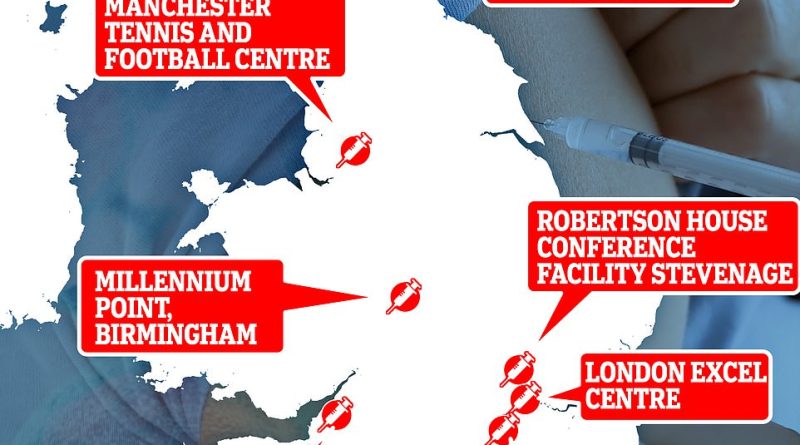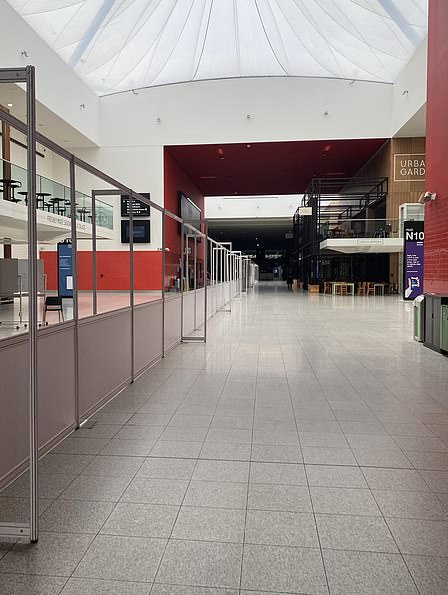Boris Johnson reveals seven Covid vaccination centres will open across England next week
Boris Johnson has revealed seven mass coronavirus vaccination centres will open next week to turbocharge efforts to get jabs to millions of people and pull the UK out of a relentless cycle of lockdowns.
The hubs will be based in sports venues, conference centres and a science park in Newcastle, Manchester, Birmingham, Stevenage, Bristol, Surrey and Newham in central London. They will be operated by NHS staff and volunteers.
Number 10 has not yet revealed how many vaccinations will take place at the huge venues but they are expected to build up to each doing tens of thousands per week, MailOnline understands. It is a minimum requirement for any public immunisation centre to manage 1,000 weekly doses, and these will be some of the largest in the UK.
In its biggest ever vaccination drive, Britain is hoping to get around 13million people immunised against Covid-19, focusing on elderly people, health and care workers and people with serious illnesses, by the middle of February. If this is achieved the current national lockdown – the toughest and longest one since March 2020 – may able to be eased. But experts have warned they will need to ramp up the roll-out in order to hit the ambitious target.
Pharmacists have today called for their shops to be used to dish out the Covid-19 vaccine, and called on the NHS to use its ‘invisible army’ of volunteers to get the jabs into people’s arms.
Former prime minister Tony Blair published a ‘blueprint’ and called for the Government to throw all its weight behind the vaccine programme, using pop-up vaccination centres and putting volunteers in offices, polling stations and closed pubs.
Politicians have been trying to shift blame for disruptions to the initial supply of Oxford and Pfizer vaccines, with Boris Johnson first blaming quality checks done by the MHRA and Matt Hancock later trying to pin difficulties on limited manufacturing capacity.
The Health Secretary today said in Parliament: ‘The rate-limiting factor is the amount of the actual juice available, the actual vaccine, which is not manufactured like a chemical it is effectively… a biological product.’ He described the vaccine manufacturing process as ‘complicated and difficult’.
And Britain felt a pang of envy today as Europe approved the Moderna vaccine and will start to get deliveries of the 95 per cent effective jab from next week, while Brits must wait until March because officials didn’t pre-order it.
It comes as daily deaths from the virus in the UK went above 1,000 for the first time since April – to a total of 1,041 – and health chiefs reported another record-high 62,322 new infections.
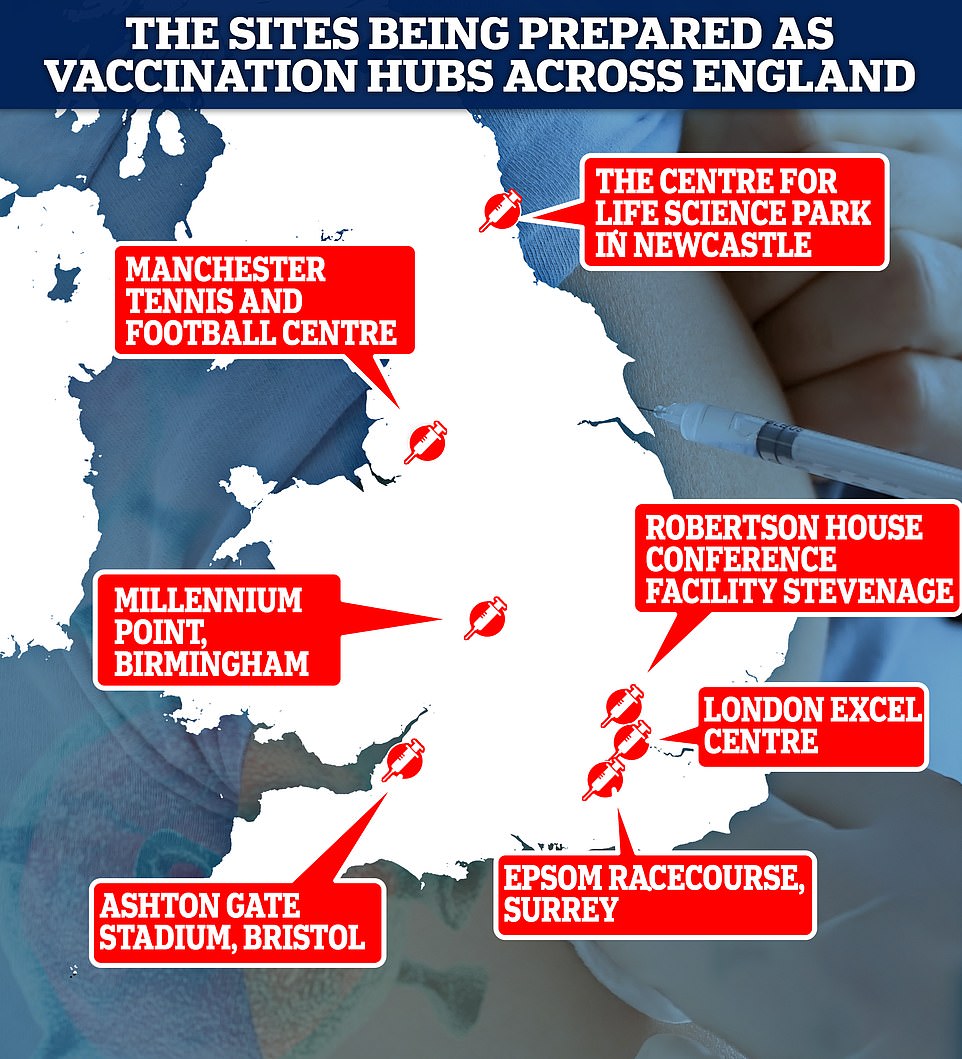
Above are the locations of the seven mass vaccination centres that will begin operating from next week. They were revealed today by the Prime Minister
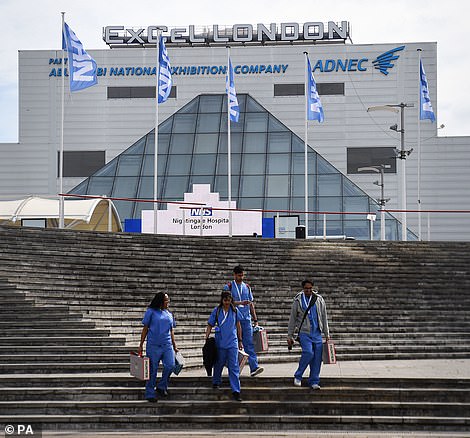
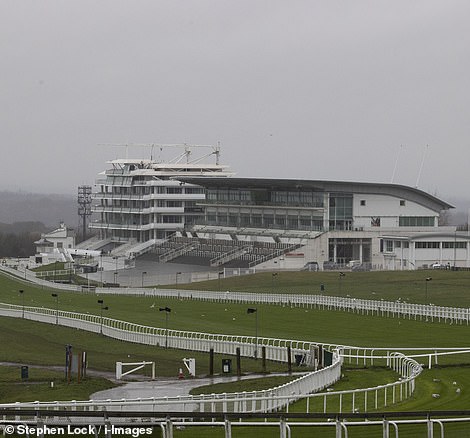
London’s Excel Centre, left, and Epsom racecourse in Surrey, right, will both be used as mass vaccination centres, the Prime Minister has said
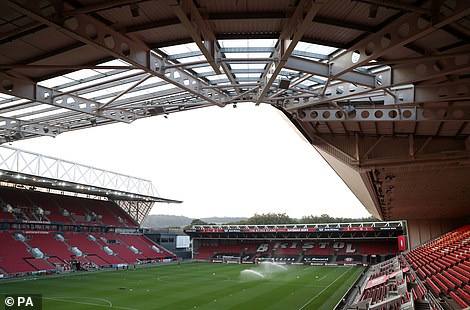
Ashton Gate Stadium, Bristol
The Prime Minister’s official spokesman announced the mass vaccination centres had been set up in the country.
The Etihad Tennis Centre, Manchester, and Epsom Racecourse, Surrey, are both to be used for giving out vaccines, alongside Robertson House, Stevenage, the Centre for Life, Newcastle, the Ashton Gate Stadium, Bristol, and Birmingham’s Millenium Point.
The Press Association news agency reported five other locations are also being considered as vaccine hubs.
These were the Derby Arena, Black Countr
y Living Museum, Dudley, Malvern’s Three Counties Showground, Worcestershire, Villa Park the home of Aston Villa FC, and Leicester Racecourse.
It comes after supermarket chain Morrisons confirmed that car parks at three stores in Yeovil, Wakefiled and Winsford would host drive-through vaccinations from Monday, with a further 47 offered to the Government.
Premier League club Tottenham Hotspur have also offered the use of their stadium to the NHS as a venue to roll out the coronavirus vaccine.
High street pharmacies including Superdrug and Boots will start to dish out vaccines from next week and other businesses have come out of the woodwork to offer their premises for jab locations.
The Royal Pharmaceutical Society said today there were thousands of high street pharmacies ‘ready, willing and able’ to assist in the rollout of the programme, which will require jabbing a mammoth three million Brits a week if Boris Johnson is to hit his target of loosening lockdown rules by mid-February.
So far only 1.3 million people in the UK have been vaccinated with the Oxford/AstraZeneca or Pfizer/BioNTech jabs since the programme launched a month ago.
There is growing clamour for the process to be ramped up dramatically – with concerns that local chemists and other facilities are not being used enough.
The Royal College of GPs warned Number 10 must ditch its ‘bureaucratic barriers’ and start recruiting pharmacists if it wants the roll out to be a success, while the National Pharmacy Association claimed it was a ‘no-brainer’ that local chemists are brought on board because the nation was ‘crying out for convenient access to the vaccine’.
Sandra Gidley, president of the RPS, said small high street pharmacies could help administer an extra 1million doses a week and bolster the lagging rollout. She told the BBC Radio 4 Today programme: ‘We are already used to delivering the flu vaccine. You have got an army of trained vaccinators who are ready, willing and able to play and part.
‘With the AstraZeneca vaccine there is no reason why that could not be delivered through community pharmacies. There are over 11,000 pharmacies. If each of those does 20-a-day that is 1.3 million-a-week extra vaccines that can be provided, very often to those who are hardest to reach. Why would any government not want to do that?’
Former prime minister Tony Blair today said the UK needs to dramatically accelerate its coronavirus vaccination programme in order to lift lockdown rules in the spring.
Claiming ‘it’s not complicated’ on live TV this morning as he launched a ‘blueprint’ for improving the country’s vaccine roll-out, Mr Blair suggested restrictions could ease ‘significantly’ in February if the NHS scales up to millions of jabs every week.
As supplies flow into the country in the coming weeks, Mr Blair said, officials should strain every sinew to make sure every dose is used as soon as possible. He said there should be pop-up vaccine centres and mobile ones, that pharmacies should be used, and volunteers recruited en masse.
Polling stations, pubs and offices should be used as hubs and supplies could provide as many as three million doses per week by the end of February, the Tony Blair Institute for Global Change said in a report.
By the end of February, the institute claims that half the population could have had the first dose of a vaccine to protect them from Covid-19. Britain has only pledged to vaccinate 13million of the most vulnerable residents by the middle of next month.
Mr Blair has become involved in the vaccine policy after he was the first to publicly suggest restricting jabs to one dose to begin with and stretching them further, avoiding holding back supplies to ensure people get a second one. This has since become the official policy of the Government’s roll-out.
In other big vaccine news today, Europe’s drug regulator approved Moderna’s coronavirus vaccine and will get supplies from next week thanks to a deal it struck in summer last year.
But Britain will miss out on early access to the vaccine because it officially left the EU last week and did not place its own order early enough to get an exclusive supply.
UK regulators didn’t rush to approve the vaccine when phase three trials finished at the end of last year because it couldn’t get any delivered until the spring.
They will now have to do their own assessment of the jab because the automatic carry-over for licences granted by the EU ended with Brexit.
Moderna’s jab, which appears to be just as good as Pfizer/BioNTech’s and works in the same way, is already being used on members of the public in the US.
The US got first dibs on supplies of the jab in exchange for funding its research and development, and other countries were offered deliveries early in 2021.
Experts on the European Medicines Agency gave the vaccine their seal of approval today and the European Commission finalised a deal for 180million doses.
Europe pencilled in a deal in August and deliveries of the first batches will begin next week, Moderna confirmed today. The company ‘continues to be in discussion’ with the UK.
Scientists in the UK said not ordering Moderna’s vaccine earlier was not an error because it would have been a gamble to order another vaccine the same as Pfizer’s, both of which use the same technology that had never been tried before Covid-19.
But as Britain is now scrambling to vaccinate millions of people every week and fears being hamstrung by supply shortages, an extra jab could have been a blessing.
As the Government comes under fire for slowing down the vaccine programme, private businesses across the country have offered up their premises to be used for free as vaccination centres, including Bensons Beds.
London gay clubs The Royal Vauxhall Tavern and G-A-Y have offered their venues to be used for the potentially lockdown-ending plans.
Jeremy Joseph, owner of G-A-Y, has offered up all of his venues for the vaccinations and said its 24-hour licence meant it could offer round-the-clock vaccinations.
James Lindsay, CEO of the Royal Vauxhall Tavern, told the Press Association he wanted to play his part in the fight against the virus.
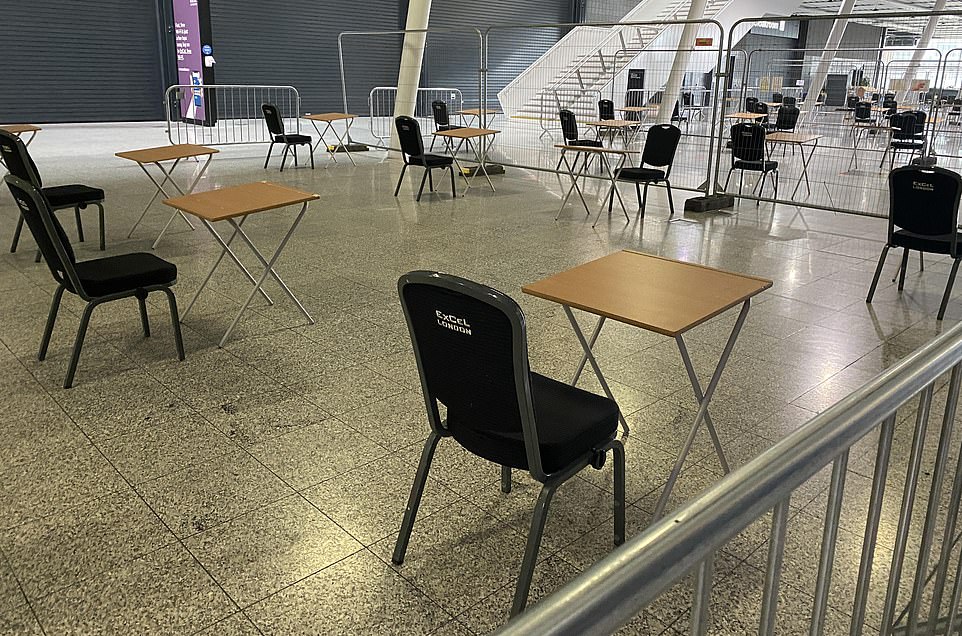
Above are pictures from inside the Excel Centre last month. They show t
ables and chairs laid out, possibly in preparation for the roll out of the vaccine
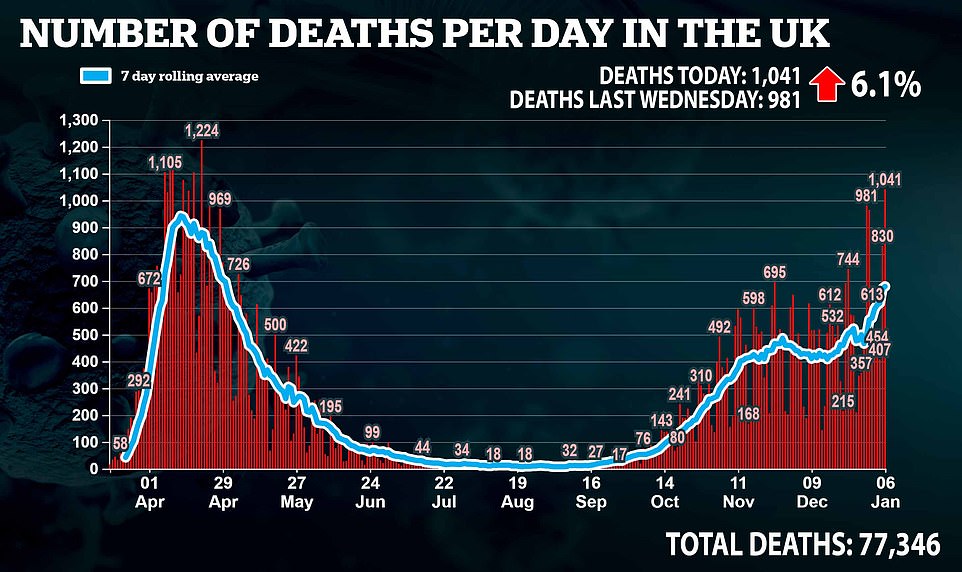
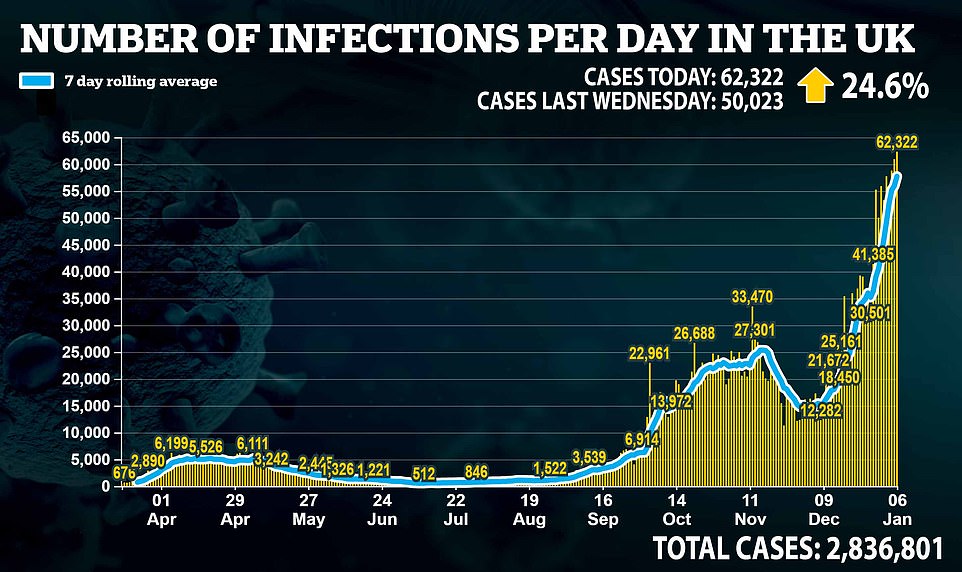
The announcement that London’s Nightingale Hospital could now be used for vaccinations comes after it emerged it would open to patients again and start admitting recovering Covid patients who have tested negative for coronavirus. But it will not have all of its now 300 beds – cut from an original 4,000 – available until next month.
A spokesman for NHS England did not deny they had significantly cut the number of beds, and said the number would be determined ‘by the demand and availability of staff’.
The seven Nightingales were left largely unused during the first wave despite £220million of taxpayers’ money being pumped into them, as hospitals struggled to spare the needed doctors and nurses to man their wards. Just 57 Covid-19 patients were admitted to London’s Nightingale, Department of Health figures show.
The NHS also admitted the emergency facility would be used for non-Covid patients, despite millions being poured into equipping it with ventilators during the first wave for those suffering the worst effects of the virus.
‘It will provide rehabilitation for people who are recovering after an emergency hospital stay and who are not Covid positive, freeing up other beds in hospital for Covid-19 patients,’ they said.
The Nightingale in the capital was built to much fan-fare during the first wave of the pandemic, with Health Secretary Matt Hancock heralding it a ‘remarkable feat in these challenging times’.
But it was left idling for months after barely a month in use, before the order to start stripping the hospital was given – as clearly shown by shocking photos from inside it last month revealing empty wards.
Frantic efforts were then launched to re-construct a ‘scaled-down’ version of the mothballed hospital, sources said, at further expense to the public purse.

